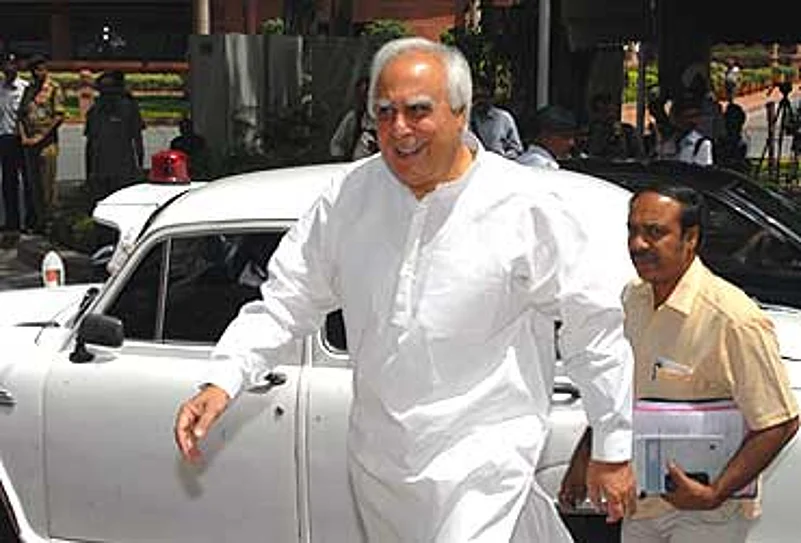
But is getting rid of marks altogether the answer to the country's examination ills? The minister is following what educationists have been advising for sometime now: don't burden schoolchildren with examinations. And Sibal is doing exactly that: destressing children and parents by taking the heat out of examinations. Not many are convinced about the proposal to make Class 10 exams optional. It's a blunder, teachers across the country are saying. The Class 10 exam is a useful dress rehearsal for the Plus Two stage. "With no examinations," says Sister Theresa, principal, St Ann's School, Hyderabad, "students and teachers may have a casual approach till Class 10, missing out on competition, so crucial to the Class 12 examinations." If destressing students is the idea, she says, why not reduce the number of papers a student has to give in Class 10 or have a general aptitude paper instead. "No one has complained so far, so why change?"
If there is an advantage in making Class 10 exams optional, it is in allowing students to choose a stream of their choice in Plus Two irrespective of marks. Or as Boral Rishi of the Rajnarain Girls' High School in Calcutta says, "As things stand now, students who do not want to go into a particular stream (for instance, math or science) still have to pursue the subject keeping in mind the 10th boards. If it's done away with, they could focus on the subjects of their interest."
However, the tinkering with Class 10 exams could well prove disastrous, according to D. Rao, principal of the Global Indian International School in Hyderabad, "should the government fail to carry forward a comprehensive overhaul of the education system. Any lapse and dilution of this drive (making Class 10 exams optional) ahead would certainly boomerang and derail the education system."
The practical implications of scrapping the Class 10 boards, introducing grades in Class 12 and a common national curriculum have teachers across the country worried. Says Soumya, who teaches at a government school in Bangalore, "Our system is not equipped to assess the ability of a child and institutions may refuse to offer seats to students who exercise the option of not sitting for the boards." Rao too feels that if the Class 10 boards are made optional, the government needs to indicate admission procedures to higher studies/employment guidelines.
"A national-level examination in the 12th will also not factor in needs of students coming from different states," says Soumya. The states are already seeing this as a diktat from the Centre and an erosion of their autonomy. Many of them offer pre-degree courses in specialised subjects such as electronics and computers, for which the Class 10 results are a benchmark. Fellow minister Jairam Ramesh also airs scepticism about the move, saying, "Some of the proposals were as old as 15 years. The Centre had to put them on hold because the states never agreed to implement them. Sibal should have consulted the states before making the announcements that have unnecessarily antagonised them into disagreeing with good ideas."
Further, in a society driven by competition, not many are laying store by grades instead of marks. The move might affect the way students approach competitive examinations. "Our system requires both marks and grades," says Rao. Replacing marks will increase the confusion as more students will share the same grade. Given the limited number of seats colleges have, it'll be even more difficult for authorities to shortlist candidates for admissions. They would probably have to conduct entrance exams, instituting one more hurdle for students to cross.
Of course, you could well ask how many students actually make it to colleges in the country every year? A mere 10 per cent of the more than six lakh students who take the boards. Shouldn't Sibal be concentrating more on increasing the number of colleges? According to the Knowledge Commission's report on higher education, there should be at least 1,500 universities (instead of the current 135) if we wish to reach the 15 per cent gross enrolment ratio target by 2015! What is Sibal doing about this?
He and his ministry have drawn up a plan, which apart from the 'groundbreaking' Class 10 and 12 proposals, also include the following:
- Pass the Right to Education Bill
- Further the use of information communication technology (ICT) in secondary schools and in open/distance schooling through broadband connectivity
- Evolve a broad-based national curriculum framework
- Explore the possibilities of setting up an independent accreditation body in school education to keep a check on the quality of education in schools
- Review the functioning of existing deemed universities
- Set up an autonomous overarching authority to oversee higher education
Most of all, however, there has been a chorus of voices asking for a complete overhaul of the school curriculum. Says Anita Rampal of Delhi University who was part of the committee that framed the national curriculum framework in 2005: "The entire school curriculum has been tailored to suit the requirements of our universities. We should first clarify the purpose of a school education and delink it from colleges. School-leaving examinations or assessment should not be linked to college admissions."
Finally, what has everyone running really scared is Sibal's promise to liberalise education on the lines of Prime Minister Manmohan Singh's attempts to open up the economy: allow foreign direct investment. Educationists warn that reforms should not be confused with privatisation, it has to be equitable. Nor can the State distance itself from providing it. It cannot be a product available to a select and privileged few.
By Anuradha Raman with Venugopal Pillai in Hyderabad and Dola Mitra in Calcutta






















